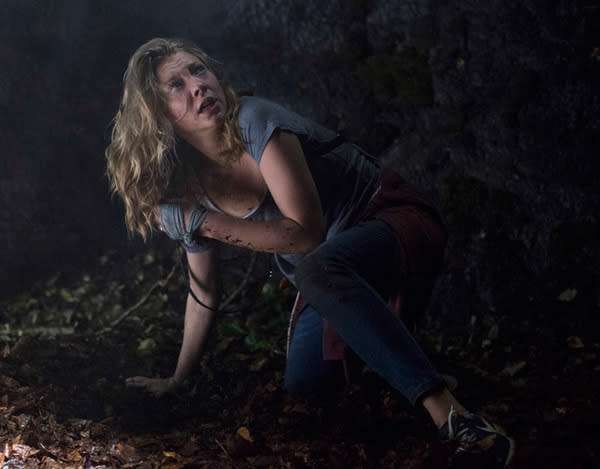The whole point of the horror film genre is to take something society finds frightening and exploit it to make audiences uncomfortable. In the hands of skilled filmmakers, this can be wonderful, thought-provoking and horrifying. Unfortunately, The Forest has the distinction of not only being tasteless and condescending to both Japanese culture and victims of suicide, but it's pretty dull to boot.
The film follows Sarah (Natalie Dormer), who gets a call from Japanese police that her troubled twin sister Jess (Natalie Dormer in goth makeup, because that's what troubled women look like) has mysteriously gone missing during a field trip with her Japanese English students. Not only is she missing, but she's missing in Aokigahara, a Japanese forest by the base of mount Fuji known for being a popular location for suicides. Convinced her sister is still alive despite the discouraging details of her disappearance, Sarah heads to Aokigahara to begin searching.
This is a horror movie marred by Orientalism; within an hour of her arrival in Tokyo, Sarah sees giggling Lolitas, hears zither music and eats still-wriggling sashimi as Japanese people laugh at her disgust. Schoolgirls sing on the soundtrack. Every Japanese person seems to believe in spirits, which the film paints as an mystical connection to the beyond, a charming, outdated anomaly that frustrates stubborn white people who just want to get things done.
On top of these tired stereotypes, The Forest is also pretty boring, free of scares beyond creepy, heavily made-up demon faces popping up in Sarah's field of vision. A sizable chunk is devoted to Sarah and another expat, travel writer Aiden (Taylor Kinney), wandering the forest. There's a shard of promise buried in here about starting to see things when you're afraid and how the paranoia of the paranormal can obscure the very real dangers lurking in front of them. It's ultimately a murky premise, though, with a semi-compelling third arc that seems to suggest Aiden is not who he seems, getting lost after the sixth or so creepy schoolgirl.
Choosing what should and shouldn't be the subject of a film is a topic that doesn't need to have an answer, but Aokigahara is a real forest, one that exists in a country 15th in the world for suicide deaths, and it feels weird to characterize it as a mystical place where ghosts in kimono make people want to die.
Other, mostly mediocre movies set on Aokigahara, such as Gus van Sant's The Sea of Trees, tread a line between sentimental schlock and insensitivity. The Forest's filmmakers didn't think it questionable to make the reveal of suicide victims jump scares, or include a line of dialogue that waves off a character's past suicide attempts as "romantic"? The motivations behind suicide are sad and frightening enough without hokey ghosts.
(Universal)The film follows Sarah (Natalie Dormer), who gets a call from Japanese police that her troubled twin sister Jess (Natalie Dormer in goth makeup, because that's what troubled women look like) has mysteriously gone missing during a field trip with her Japanese English students. Not only is she missing, but she's missing in Aokigahara, a Japanese forest by the base of mount Fuji known for being a popular location for suicides. Convinced her sister is still alive despite the discouraging details of her disappearance, Sarah heads to Aokigahara to begin searching.
This is a horror movie marred by Orientalism; within an hour of her arrival in Tokyo, Sarah sees giggling Lolitas, hears zither music and eats still-wriggling sashimi as Japanese people laugh at her disgust. Schoolgirls sing on the soundtrack. Every Japanese person seems to believe in spirits, which the film paints as an mystical connection to the beyond, a charming, outdated anomaly that frustrates stubborn white people who just want to get things done.
On top of these tired stereotypes, The Forest is also pretty boring, free of scares beyond creepy, heavily made-up demon faces popping up in Sarah's field of vision. A sizable chunk is devoted to Sarah and another expat, travel writer Aiden (Taylor Kinney), wandering the forest. There's a shard of promise buried in here about starting to see things when you're afraid and how the paranoia of the paranormal can obscure the very real dangers lurking in front of them. It's ultimately a murky premise, though, with a semi-compelling third arc that seems to suggest Aiden is not who he seems, getting lost after the sixth or so creepy schoolgirl.
Choosing what should and shouldn't be the subject of a film is a topic that doesn't need to have an answer, but Aokigahara is a real forest, one that exists in a country 15th in the world for suicide deaths, and it feels weird to characterize it as a mystical place where ghosts in kimono make people want to die.
Other, mostly mediocre movies set on Aokigahara, such as Gus van Sant's The Sea of Trees, tread a line between sentimental schlock and insensitivity. The Forest's filmmakers didn't think it questionable to make the reveal of suicide victims jump scares, or include a line of dialogue that waves off a character's past suicide attempts as "romantic"? The motivations behind suicide are sad and frightening enough without hokey ghosts.
